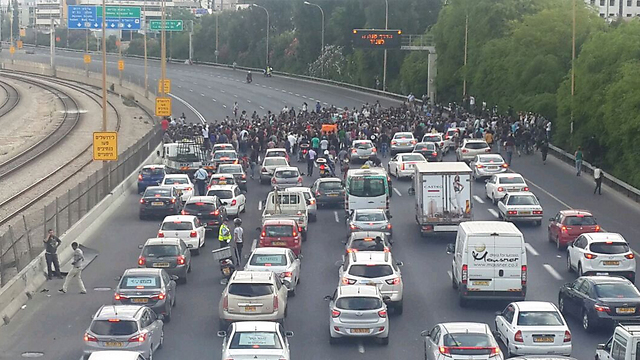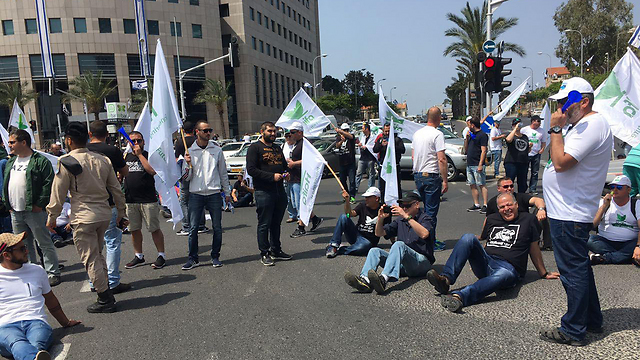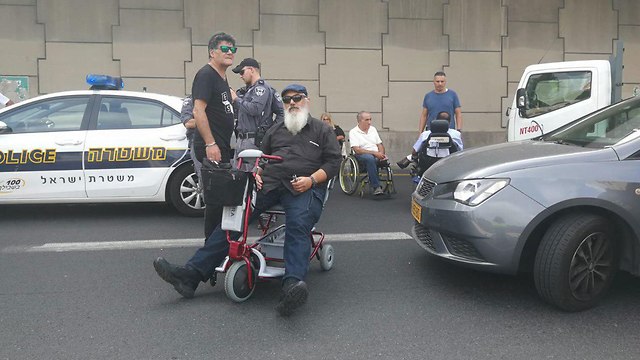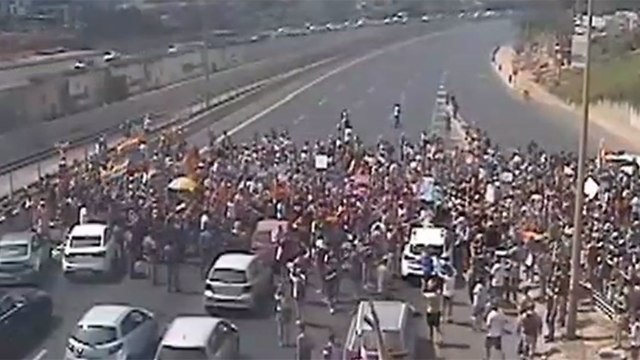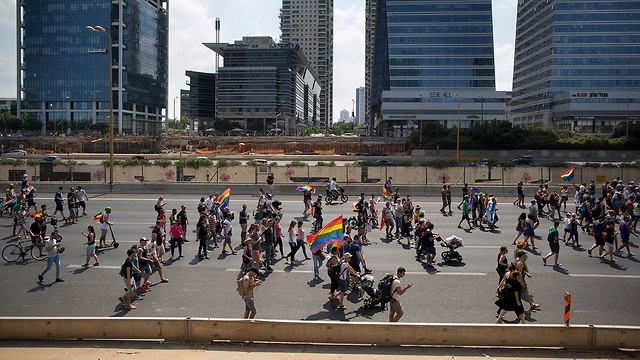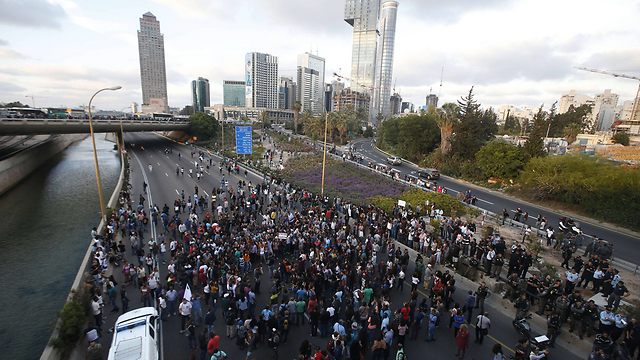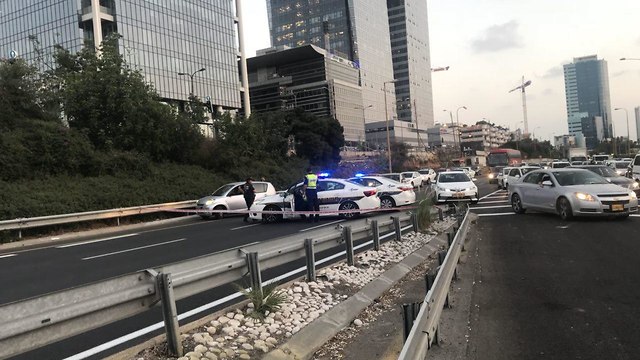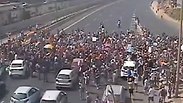
The ultimate blocking of Ayalon Highway
Asaf Israeli is sick of the ease with which an endless array of interest groups block roads, disrupting the lives of average citizens to express their anger at government policies—all with the backing of the police. So he created an ironic Facebook event to protest the blocking of Ayalon by blocking Ayalon.
Social workers, LGBT activists, the disabled, Gaza border residents, firefighters, Ethiopians, bus drivers and advocates for medical cannabis all have one thing in common: They all blocked the Ayalon Highway (Tel Aviv's main artery) in protest at some point during the last six months.
"Since June 2018, the Shalom Interchange has been blocked to traffic more than ten times," says Asaf Israeli, who has closely followed the phenomenon. "And this is without counting Highway 1 and other junctions that have been blocked all over the country."
The unbearable ease with which various interest groups block roads in Israel has been bothering the 26-year-old fourth-year Technion medical student. "For quite some time now, it has been in my head, coming up in conversations with close friends," he says. "True, there are many injustices and many protests I think are just, but what bothers me is the willingness to harm the public at large to advance them, to try to deal with injustice by means of injustice is not the proper way in my opinion."
The women's protest last Tuesday—during which the Shalom Interchange at the heart of Tel Aviv was blocked again—was only the straw that broke the camel's back. Israeli does not consider himself a Facebook fan or a political activist, but the next day he decided to do something: He logged on to Facebook and created a new event under the brilliant name "Block Ayalon—The Big Protest Against the Blocking of Ayalon."
Israeli's idea is simple: To express his objection to the repeated blocking of roads, there is no choice but to block the Ayalon Highway.
"Are you tired of the blocking of Ayalon road at every protest?" he wrote. "Are you tired of the constant lack of consideration and harm to the freedom of movement? The biggest protest in Israel is underway! To achieve our goal, we will block the Ayalon Highway. Only then will we be heard."
The Facebook event was arbitrarily set for May 2021, and according to its schedule at 11am, participants will meet at Ayalon North and block the traffic. At 12pm they will hear speeches about why it is not right to block Ayalon, and by 2pm they will disperse.
The event immediately attracted thousands of participants within days. "It started as a joke, but it quickly gained momentum, and I realized that Facebook was a great platform to tell people how blocking roads causes so much harm," says Israeli, for whom the fictitious "event" he created is a real tool for transmitting the message.
Over the weekend, as if in a sign from the heavens, the Ayalon Highway was blocked due to heavy rains, giving the group momentum and the confirmation that they were shouting in the right direction.
Things are so absurd, says Israeli, that there were people who mistakenly thought his protest was real and that he really intended to block Ayalon. "We are at a point where it is so common to block roads that they took what I wrote seriously, and they told me I was wrong. Then there were people who wrote to me to say the protest was justified, and it was the only way anyone would really listen to us. Many people believe that for any issue that garners a thousand supporters, it is okay to block a road here."
Everyone gets screwed
Blocking roads in protest, and especially main roads capable of paralyzing the country, is a well-known political practice. But in recent years, and even more so since the great social protests of 2011, blocking roads has become so popular that its effectiveness has become highly watered down.
"To harm so many people for the interests of a specific group is political bullying that does not get us anywhere," claims Israeli. "One day Group A screws over the rest of society for the sake of injustices they feel they are subjected to and the next day Group B does the same. Everyone is trying to advance their own interests by screwing everyone else; the end result is everyone gets screwed.
Another point Israeli is trying to convey is that it is okay to support a particular protest even if one does not agree with the methods the protesters choose; especially when it harms people who are not to blame.
"Because the event was created shortly after the women's protest, people asked me whether I opposed it," he says. "But it has nothing to do with domestic violence. It is about the fact that blocking roads has become a legitimate method of conveying political messages.
"We have reached an absurd point whereby if one does not agree with how the women's protest is being carried out, he is a misogynist; if he does not agree with the LGBT protest, he is a homophobe, and if he does not agree with the Druze protest, he is a racist," Israeli laments.
"There is a lack of acceptance of people who disagree with your opinions, and if they do not agree, they automatically turn into bad people."
Digging a tunnel to Beirut
Israeli's sham protest, behind which stands a serious political-social idea, was welcomed by Facebook's cynical users, alongside "events" such as "The Million People Demonstration in Rabin Square Against the Millions of Demonstrations in Rabin Square" and "Let's Dig a Tunnel to Beirut (and show the Lebanese that we also know how to dig a proper tunnel)."
There is no doubt that there are groups in society whose grievances are legitimate. Other than blocking roads, what do you think is legitimate?
"For starters, I do not think that every problem necessarily has a solution. Sometimes the situation is not good, and there is no immediate solution. But if there is no solution, I do not know whether harming more people will change that," Israeli responds.
"By the way, many of the protests are focused on receiving government funds, so to receive funds what you are doing is causing grave harm to the economy, which is shooting yourself in the foot: You are causing the state to lose millions and reduce the government's ability to help solve the problem."
Naturally, not everyone agrees with Israeli. "No protest begins with blocking a road," says Roi Neumann, an LGBT activist and participant in the recent protest against the Knesset's surrogacy law who participated in several roadblocks.
"Before that, we were at the Knesset, we tried to shout everywhere, and it did not help. After blocking the road, the result was different; albeit the law was not changed, but the issue reached the top of the public agenda. "
When does a man decide that he has no choice but to block the road to be listened to?
"When you reach a state of total helplessness, it is not an act that you do out of joy, but out of frustration so great that you realize there is no other choice. There is a limit to how much one can take and not respond."
And that makes road blocking a legitimate act?
"It is effective, and that gives it legitimacy. Democracy is supposed to work in such a way that people express their protest in all kinds of ways, and the government understands them and acts accordingly; but the second part does not happen. If public order is not disturbed, the government does not feel obligated to do anything and citizens have no other recourse."
After the blockades, did you feel that the public was for you or against you?
"Definitely for us; the people who were stuck in the traffic jam around us did not curse, they understood and applauded us."
Do you understand the group that opposes road blocking?
"It is a privilege of people who do not understand the frustrations. So people stand in a traffic jam for half an hour, big deal. The damage to the lives of citizens is minor. I too experienced traffic jams during other protests."
Police are to blame
Incidentally, one of the points Asaf Israeli makes against the practice of blocking roads is that it is done with the full cooperation of the police. "In fact, the ones blocking the road are the police, not the demonstrators," he says. "There is no enforcement here. Perhaps it is intended to prevent flare-ups, but in a sense the police are participating in harming citizens."
An activist who has been involved in roadblocks recently confirms this claim. "Blocking roads is coordinated with the police, of course," he says. "You come to the spot, the police secure the intersection so that a psycho does not come and run you over, and then you go down to the road and block it. The police are asked to take pictures, perhaps even stage a few forced removals, and after ten minutes everyone goes home."
What Israeli intuitively understands is confirmed by academia. "Without a doubt, because the blocking of roads has become such a common occurrence, its proliferation actually lowers support for the protest itself," says Prof. Tamar Hermann of the Open University and the Israel Democracy Institute, who specializes in political protest.
"Protesters essentially want two things: To raise awareness of their cause and to gain the support of more parts of society. When you block a road once, the public says, 'All right, we'll give it to them.' But when it becomes a common occurrence and a constant infringement on public order, members of the public who might have otherwise supported the protest turn their anger toward the protestors," says Hermann.
Did the demonstrators blocking the road last week in protest against domestic violence not gain the support of the general public?
"I do not know what you felt after the road blocking, but someone who was stuck in a traffic jam was certainly not enthusiastic about supporting them. Who are you punishing when you block a road? Not the government, which has the responsibility and the ability to influence. The driver stuck in traffic has no ability to increase the stipends for the elderly or prevent the next domestic violence murder. In fact, it serves the interests of the government to let the protesters block the road, and then the anger is directed at them instead of at the government."
Therefore, according to Hermann, the practice of blocking roads has been exhausted. "There is a point where the ritual of protest becomes meaningless, so the biggest challenge is finding creative and innovative forms of protest."
And yet, what do the countless road blockings say about the political culture in Israel?
"They are testimony to widespread public participation in politics. We at the Israel Democracy Institute have recently published the Democracy Index, and we see that relative to other countries, Israel has been ranked by outside experts as having a high degree of political participation. People are very involved, and in this sense we are a vital and active democracy."










